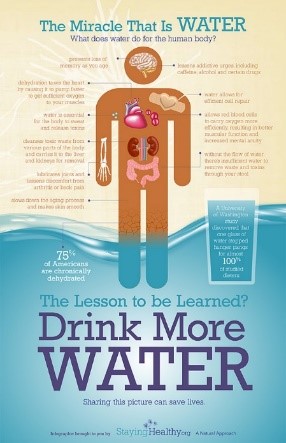Dehydration
Dehydration occurs when we lose more fluids than we are taking in. The lack of water in the body may result from either a decrease in fluid intake or an increase in fluid loss. 75% of our body weight is water. Water helps transport waste, supports tissue and cell hydration and helps regulate your temperature. Dehydration can be an important factor in illness and even death. Diarrhea and vomiting are the most common reasons why someone loses excess fluid.
Dehydration symptoms include, but are not limited to:
- Urine is concentrated and more yellow,
- Dry mouth and nose,
- Dry skin,
- Decreased tear production,
- Headache,
- Dizziness,
- Sleepy or tired, and
- Light headed (especially when standing)

SEVERE dehydration symptoms can include, but are not limited to confusion, lack of sweating, little or no urination, weakness, coma, organ failure (esp. kidney), changes in vital signs (increase in pulse and decrease in blood pressure), and “tenting” of skin (sticks together, stays upright when pinched together).
Your role if symptoms are noted:
People who have symptoms of dehydration should see their health care professional as soon as possible or go to an emergency department for an evaluation. You should immediately notify your supervisor and follow your agency’s documentation rules.
Preventing dehydration:
- Offer clear fluids including water, broths, popsicles, Jell-O;
- Have a variety of beverages available, as not everyone likes the same thing;
- Drink frequently during the daytime, rather than drinking large amounts at one time;
- Cool off indoors with a fan if person has been outside and temperature is high; and
- If appropriate, offer Pedialyte, Gatorade or Powerade (these contain electrolytes).
Hydration is important for everyone! Hydration considerations include:
- The average person requires 64 ounces (8 cups) of water daily;
- Some people cannot tolerate that much fluid and must have restrictions – their medical doctor should be consulted regarding the recommended amount for them based on health concerns (e.g., people with congestive heart failure and end stage renal disease);
- Good hydration is important with or without a g-tube, especially if a person drinks thickened liquids;
- Some people may have difficulty swallowing which can lead to a decrease in fluid intake (e.g., Parkinson’s disease, dementia, stroke); and
- If caring for someone who cannot communicate to ask for something to drink, remember to offer fluids frequently (every hour) to keep them hydrated.